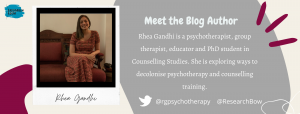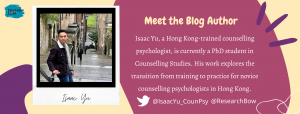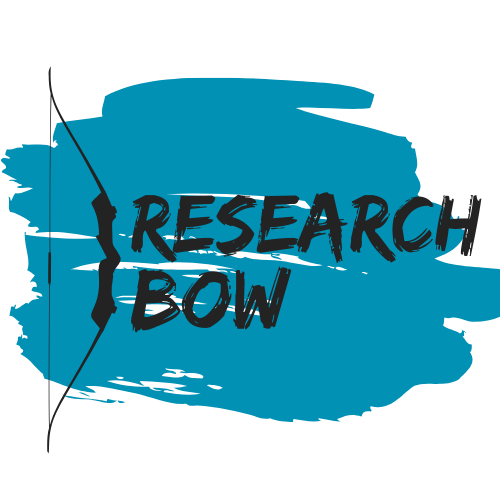The PhD journey can be lonely, especially at the beginning when everything feels uncertain and overwhelming. Peer support is crucial at this time, providing emotional support, encouragement and feedback. In this article, Rhea and Isaac share how they found solidarity during their PhD journeys. Rhea, a PhD student moving to Edinburgh from India, and Isaac, a PhD by distance student living in Hong Kong, both felt isolated and overwhelmed at the beginning of their PhDs. They found ways to connect with other PhD students and formed a community that helped them not only with their research but also with their personal growth.
Meeting Each Other: So close, yet so far
Rhea: Isaac and I met in our research class for the first time one morning in September 2022. He was on a computer screen and I was in class in Edinburgh. We were both just starting out with our full-time PhDs but were having very different experiences doing so. I was navigating moving countries (from India to Scotland) and setting up a new life in Edinburgh, being confronted with a cost of living and housing crisis – just trying to find my feet in these unknowns.
Isaac: Rhea and I met in our research class for the first time in one evening in September 2022. She was on a computer screen with other students studying in Edinburgh, while I was attending remotely my class in a small office with only books and my trusty laptop in Hong Kong. We were both just starting out with our PhD’s but being a full-time student after almost a decade, adapting to my new role proved to be challenging, especially when it came to comprehending the complex and intricate ideas of qualitative research through online learning.
Loneliness in the PhD journey
Whether you’re doing your PhD in person or by distance there are a few themes that cut across these experiences. The beginning feels lonely and unknown. And while we had our supervisors to guide us, the need for peer support was even more. Very few things in life can blossom in isolation – just as it takes a village to raise a baby, the process of nurturing our research also benefits from putting our heads and hearts together.
Rhea: Loneliness takes a different form when you have moved countries for your PhD. We are away from everything and everyone familiar, the safe space that helps one think and create is taken away and we have to rebuild it from scratch. For the most part, we don’t have a classroom and a permanent set of peers to ease into making friendships. And if like me you are starting your PhD journey after having worked professionally for over 5 years, you are experiencing a different life stage too, returning to academic life and the financial instability of earning a minimum wage stipend.
Isaac: As a PhD by distance student, being away from your peers and having to navigate the academic landscape on your own can be a daunting task. This was my experience during my first semester. Studying online often comes with its own unique challenges. Internet and audio connectivity issues can be frustrating and disruptive, it can be difficult to stay motivated and focused, affecting the overall learning experience. I also often felt that I was missing out on the social aspect of university life, where I could share my insecurities and seek mutual support in the learning process.
The Importance of Community
Being able to discuss not just our research ideas, methodologies etc. but also our fears, emotions and excitement felt equally important. The value of a community of people traversing a similar, new, unpredictable terrain is unparalleled and, in this blog, we’d like to speak of the ways in which finding this has helped not only our research but ourselves.
Rhea: As a PhD student in Edinburgh, it felt important not only to connect with other PhDs but especially with those who understood and felt equally excited by the topics and ideas that interested me. The most revealing part about this was that this cut across disciplines – I have met so many wonderful researchers in seemingly ‘different’ schools that shared the same passion for theorists, writers, and academics that I was drawing from. It is these conversations, discussions, complaints, and rants that bring our experiences alive and make our research feel more ‘real’, especially in the beginning when it feels as though this only exists inside of our heads. Finding a way to talk to others about my research has helped me understand what it is that I am actually doing.
Isaac: As a PhD student studying remotely, my learning experience transformed when one of the students on campus created a WhatsApp group1 for us. Suddenly I felt more connected to my fellow students, and we were able to support each other as we grappled with the abstract and difficult concepts in qualitative counselling research. To this day, we still share our experiences and help each other overcome our challenges, which has made our PhD journey more bearable. This group has acted as a virtual study group, helping each other with our essays and exploring various conference and training opportunities. The existence of this group has greatly enhanced my learning experience by reducing my sense of isolation and fostering a greater sense of belonging within a community of passionate learners.
A Community of Social Support: The PGR Workspace
By joining a community of peers with similar experiences, you can gain invaluable emotional support, encouragement, and feedback. It also provides opportunities for collaboration, idea sharing and networking, which can enhance your academic experience and potentially lead to future collaborations.
Rhea: The PGR office was exceptionally valuable in being able to form this community. Personally, I prefer working from home, but the PGR workspace became a social space for me – a place I could rely on to bump into friends and colleagues that might feel as stuck as me or offer helpful advice on almost everything under the sun.
Isaac: The turning point in my learning journey was my visit to Edinburgh from mid-January to mid-May. After talking to Rhea and a few other first-year students, I felt confident and quickly settled into life in Edinburgh. Being in the same physical space as my peers was a game changer. It allowed me to build deeper relationships with them and feel a greater sense of community. I particularly enjoy working in the PGR workspace where I can make friends with different students from different cohorts and disciplines, the discussions and debates have allowed my research idea to grow and flourish. The friendships I have made here have brought me joy and it has been important to have someone to share my burdens with when I am stressed and struggling with my research work.
Bridging the space with technology
Technology has made it easier to form a community of peers who share similar experiences, even when separated by distance. The on-campus and off-campus student worlds can be intertwined to create a supportive network of individuals traversing similar, new, unpredictable terrain.
Rhea: Technology has offered us even more ability to form this community, interweaving the online and offline PGR world. Even though the PhD cohort is separated by time zones, I have been able to find intellectual and emotional encouragement through Zoom meetings, WhatsApp chats and sharing our research resources. For me, the best part of the PhD journey is that it is predominantly non-competitive because we all have overlapping interests, but our projects are all so unique in their scope, timeline, and investigation that the best way forward is through this solidarity.
Isaac: If you’re a distance student like me, I highly recommend taking advantage of any opportunity to connect with your peers. Whether it’s through a WhatsApp group or by making a physical visit to meet others, being able to connect with people who are going through similar experiences has made all the difference in my journey as a PhD student. It can significantly help combat the sense of loneliness and isolation that often accompanies remote learning. If you have the chance to travel, I highly recommend spending a few weeks or months on campus in Edinburgh, where you can have a different learning experience than studying individually in your hometown.
The PhD journey can be lonely and challenging, but finding a community of like-minded peers can make all the difference. Rhea and Isaac’s experiences show that connecting with other PGRs can provide emotional support, opportunities for collaboration and a sense of belonging. Whether through face-to-face interactions or online groups. It’s important to remember that you’re never walking alone. There are others out there facing the same challenges as you and willing to support you along the way.
1If you are a PGR in the SHiSS, feel free to contact the research bow team or the PGR Reps to be added to the available WhatsApp group chats.
If you are feeling alone here are some services and organisations, you can contact:
· The School of Health in Social Science Support Team, Email: studentsupport-health@ed.ac.uk
Support offered by the University of Edinburgh:
· The Student Association Advice Place
· Chaplaincy Listening Service
Support offered by external charities:
· Nightline, Tel: 0131 557 4444 (8pm –8am)
· Samaritans, Free call: 116 123, Text message: 07725 90 90 90, Email: jo@samaritans.org
· Breathing Space, Tel: 0800 838587 (Mon –Thu 6pm –2am, Fri –Mon 6pm –6am)
· Mind
· iThrive






